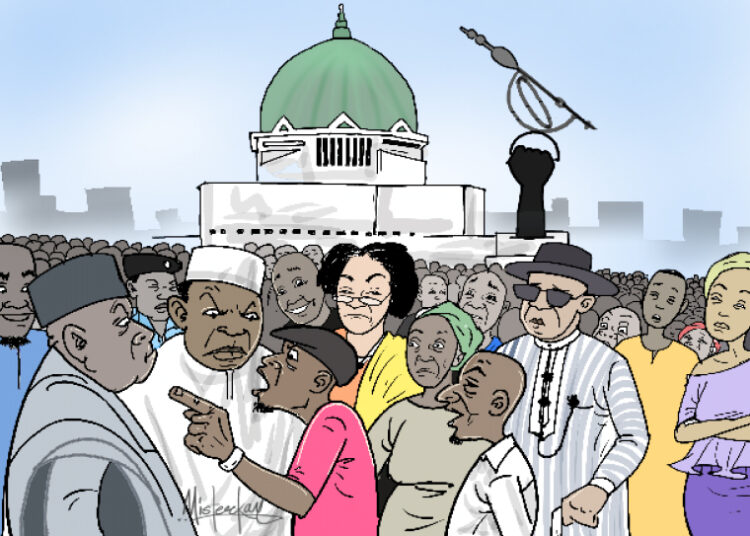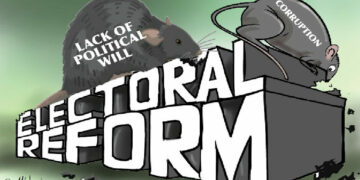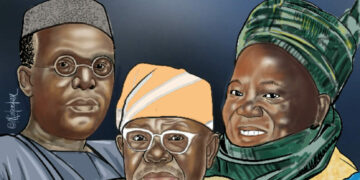Last week, a video trending on social media showed a Ghanaian lawmaker admonishing the outgoing President during the state of the nation address in a parliamentary session. The move was both brave and bold for a continent where elected officials run their ship like empires and demigods. Many across the region particularly in Nigeria commended his disposition and courage to address President Nana Akufo-Addo.
This unapologetic lawmaker had no fear for his safety and political career calling out the failures of the past administration. How wonderful it would be to have that kind of spirit amongst our lawmakers here in Nigeria? What an amazing display of grit, courage, boldness and willingness to speak truth to power regardless of the political and personal risks.
Even more rewarding to watch was the way other members of parliament cheered him on without shutting him down or telling him to ‘respect’ the President or his ‘senior’ parliamentarians. The encouragement and support he got from the floor urged him on and even the outgoing President couldn’t help but steal a smile in between the tough no holds barred admonitions.
That same week in Kogi State, Nigeria, some protesters were out on the streets in support of former Governor Yahaya Bello who is currently standing trial for the diversion of over N180 billion of the state’s resources. In a brazen but misinformed move, the protesters called on the Economic and Financial Crimes Commission to drop the charges against Mr. Bello. Mr. Femi Falana, a Senior Advocate of Nigeria called the move by protesters “illegal and offensive to national morality”.
On Truth We Shall Stand
Unfortunately, in Nigeria, we are seeing more of a growing trend of praise singers and “On your mandate we shall stand” alliances in our National Assembly who lack the moral rectitude to check the excesses of the Executive. The leadership and members of the National Assembly are now more or less an appendage of the Executive ratifying and approving their every demand.
Thankfully, there are still Nigerians who are brave enough to speak truth to power. We only ask the Nigerian police to let them speak or protest peacefully the same way they have allowed protesters for Yahaya Bello to do so without fear or harassment. After all, one of the bastions of democracy is freedom of association and freedom of speech.
Evidently, we need a new dispensation of lawmakers and advocates for democracy who will show courage, resistance, and accountability in the face of democratic backsliding and poor leadership. Nigeria needs men and women who will challenge democratic decline, erosion of civil liberties, weakening state institutions, suppression of dissent, and concentration of power.
We need more whistleblowers, journalists, activists, and civil society to hold power to account and individuals or groups who have demonstrated courage in exposing corruption, human rights abuses, or injustice. We need the state to let those who challenge the status quo do so without state or societal backlash, such as imprisonment, harassment, or exile. We need the brave and the bold who can speak truth to power in a failing democracy and sing “On truth we shall stand!”
For God and Country
In a world where democracy is increasingly under threat, Nigeria stands as a stark example of the challenges faced by nations grappling with democratic backsliding. Despite the promises of freedom, equality, and justice enshrined in the country’s constitution, the Nigerian democratic experience is fraught with systemic corruption, suppression of dissent, and a widening gulf between leaders and the people. In such an environment, speaking truth to power becomes an act of extraordinary bravery and unyielding commitment to justice.
Nigeria’s democracy, though relatively young, has shown alarming signs of strain. Elections marred by violence, vote-buying, and widespread irregularities undermine public confidence in democratic processes. Institutions designed to uphold checks and balances are often weakened by political interference, leaving the rule of law vulnerable to manipulation. Civil liberties, including freedom of speech and assembly, are increasingly under threat as dissenting voices face harassment, arrest, or worse.
This democratic decline is compounded by economic inequality, a growing youth population disenfranchised by unemployment, and systemic insecurity. In this landscape, power is concentrated in the hands of a few, while millions of Nigerians feel left behind and unheard. That is why corrupt politicians, and their allies can recruit thousands of young, poor, hungry and jobless people to protest their criminal investigation.
In such a challenging context, brave and bold truth-tellers—journalists, activists, whistleblowers, and ordinary citizens—are essential to holding power accountable. Nigerian history is rich with individuals who dared to challenge authority, from Gani Fawehinmi, the fiery human rights lawyer, to the young #EndSARS protesters who demanded police reform and justice for victims of brutality. These voices remind us of the power of collective action and the importance of speaking out against injustice.
Today, journalists like Fisayo Soyombo, David Hundeyin and Kiki Mordi continue this legacy, using investigative reporting to expose corruption and human rights abuses. Activists like Aisha Yesufu embody courage, fearlessly confront oppressive systems and inspire others to do the same. Lawyers like Chidi Odinkalu and Dele Farotimi are not afraid to call out the judiciary for their complicity. Their work not only informs the public but also serves as a rallying cry for accountability and change.
The fight for democracy and justice in Nigeria requires collective courage and unwavering commitment to the principles of freedom and equality. Citizens must remain vigilant, demanding transparency and accountability from their leaders because the price of freedom (or democracy) is eternal vigilance.
Speaking Truth to Power
For those who dare to speak truth to power in Nigeria, the risks are high. Journalists have been detained for exposing government failures. Activists face smear campaigns, legal persecution, physical threats, state orchestrated kidnappings and disappearances like that of Dadiyata who has been missing since 2019. The events following the 2020 #EndSARS and 2024 #EndBadGovernance protests—including the alleged Lekki Toll Gate massacre—underscore the dangers faced by young Nigerians advocating for change.
Beyond physical risks, truth-tellers also face social and economic ostracism. Whistleblowers often lose their livelihoods, and communities may shun activists seen as too radical or confrontational. These challenges highlight the high stakes of resistance and the urgent need for solidarity and support for those on the front lines.
Technology plays a dual role in both empowering and endangering truth-tellers. Social media platforms have become vital tools for organizing protests, amplifying marginalized voices, and exposing injustices. The #EndSARS movement and the #EndBadGovernance protests, for instance, gained global traction thanks to Twitter and Instagram, where young Nigerians shared real-time updates, videos, and calls to action.
However, the same tools that empower resistance also pose significant risks. Surveillance technologies, cyber harassment, and government-led misinformation campaigns threaten the safety and credibility of activists and journalists. The increasing push for regulation of social media platforms, often under the guise of combating “fake news,” and cybercrime law risks stifling free expression.
Ultimately, the brave and the bold—those who dare to speak truth to power—represent the best of Nigeria’s democratic aspirations. Their courage reminds us that even in the face of a failing democracy, the pursuit of justice and truth remains a powerful force for change.





